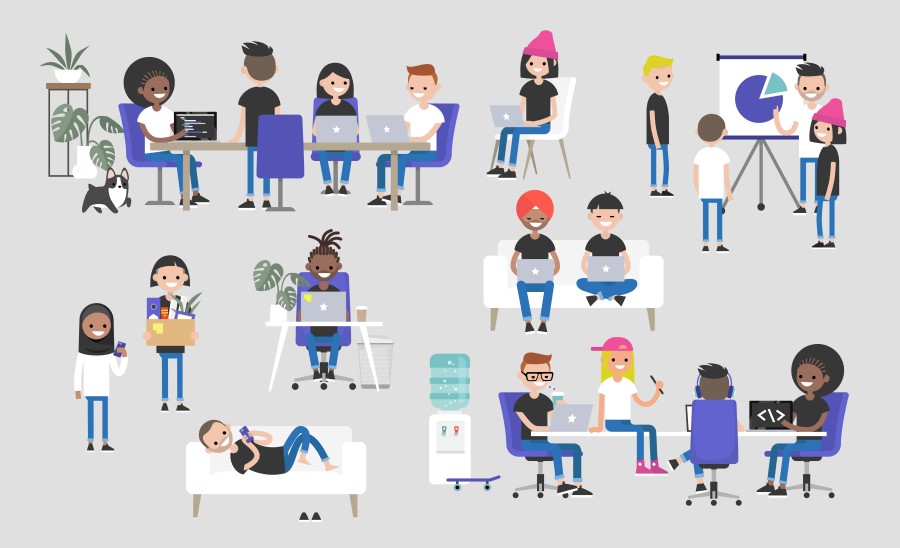Six ways to help millennials at work with their savings conundrum

For a demographic that’ll play a major part in the labour marketplace, companies need to know how to move that power in their favour.
Millennials and money
Born between 1981 and 1996, millennials grew up with the internet. They are known as the job hopping generation and aspire to have freedom and flexibility. They’re digital entrepreneurs and employers rely on them for digital and tech skills.
They’re often portrayed as a generation who waste their money on the latest fads, posting pictures from the most exotic holidays. A Barclays report found that the average 20- to 37-year-old spends more than £3,300 a year on ‘takeaways, eating out, daily coffees, socialising and buying new clothes’ – inferring they should be squirrelling the money away instead.
But in reality, this is a much more complex generation and a one-size-fits-all approach doesn’t tell the full story. 90% of millennials are basic rate tax payers which potentially means they face an uphill task in keeping their finances in order. Student loans, high rents and taking care of family (for those with young families), explains why 70% frequently borrow money to pay day-to-day living expenses.
So, how can employers truly help millennials understand their financial priorities and options?
Considering the different options available to a generation with money worries, employers need to make financial wellbeing an essential part of their workplace, rather than a 'nice-to-have'.
Here are six things to help them with.
Life cover requirements
Unnecessary for those without dependents, but those millennials with families would see life cover as important. It can help their dependants deal with everyday costs such as household bills, childcare or mortgage payments – if they pass away.
Pay off high cost debt
The stereotype of the spending-frenzied-millennial conjures up thoughts of problem debt. Helping them to understand their finances so they minimise expensive debts like overdrafts, credit and store cards is incredibly valuable. It’s important to frame debt in the right way, as a mortgage will be crucial in buying a home and living with student loan repayments will be a necessity for the majority that have been to university.
3–6 months of expenses – rainy day savings
Help them build up an umbrella to shelter them from the unexpected storms of life. Having an emergency fund in an accessible account will help mitigate the risk of unplanned events – of which we’ll all have encounters with over our lifetimes.
Saving for retirement – pension
Auto-enrolment means more millennials are putting away money for retirement, even if arguably at very low levels. But it’s essential to make sure they stay in the pension rather than opt-out. The state pension is unlikely to be enough to pay for a comfortable retirement, and most people will want flexibility to retire when it suits them.
The combined benefit of employer contributions and tax relief could make this the best place to save for the future. This makes more sense if they’re invested somewhere appropriate for their needs and objectives.
Saving for future goals - LISA
Many young people dream about getting on the property ladder but worry it’s getting harder. With a Lifetime ISA (LISA), they can save and invest for their first home or later life. It’s targeted right at millennials as only those aged 18–39 can open one. There are two types of LISA, cash savings or stocks and shares investing. They can contribute up to £4,000 each tax year until they turn 50 without paying tax on any returns and receive a 25% government bonus too, up to £1,000 per tax year.
The role of financial wellbeing
Workplace financial wellbeing can help millennials focus on making better short, medium and long-term financial decisions, and understand how best to tackle their saving options. Wellbeing programmes have also been proven to motivate and boost engagement at work.
Employers can drive this by asking them what they want help with. This helps employers put together a financial education programme to address the most relevant topics.
Typical sessions could include:
- budgeting
- savings and investments
- retirement planning.
Whatever topics an employer opts for or way they choose to present, it’s important to follow up afterwards to find out if it’s had a positive impact on the employee. They can choose to partner with an expert company that provides financial education or do it all in-house.
Conclusion
Retirement can seem a long way off for millennials, but with factors like low wages, it’s reasonable to start saving for the future as soon as possible – with at least the smallest amount. On average, millennials stay within a given role for a maximum of three years, but understanding their financial priorities and helping them meet wider financial goals can help inspire loyalty and improve retention.
The author is Opeyemi Oladimeji, marketing manager, Hargreaves Lansdown.
This article is provided by Hargreaves Lansdown.
Hargreaves Lansdown is sponsoring REBA’s Innovation Day 2019. Join us on 28 November in central London to future-proof your reward and benefits strategy.
In partnership with Hargreaves Lansdown
Welcome to HL Workplace - savings & investments your employees can understand, engage with, and value.







